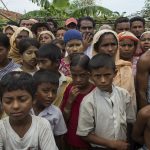Sunday marks the two-year anniversary of the start of a widespread and systematic campaign of mass killings, torture, mutilations and sexual violence by Myanmar security forces targeting the Muslim Rohingya ethnic minority in northern Rakhine province.
That violence resulted in the torching of hundreds of Rohingya villages, killed at least 10,000 Rohingya civilians and prompted approximately 740,000 others to flee for their lives to Cox’s Bazar in neighbouring Bangladesh. The trauma of the violence lives on in profound psychological trauma, wounds from sadistic mutilations and painful long-term disabilities.
Canada led international efforts for accountability for those outrages. In October 2017, Prime Minister Justin Trudeau appointed a Special Envoy to Myanmar. Following the September 2018 release of a damning UN report that implicated the Myanmar military in crimes against humanity and acts of “genocidal intent,” Canada’s Parliament became the world’s first to vote unanimously that the Rohingya were the victims of a genocide.
Canada’s Senate echoed that a month later and also withdrew honorary citizenship to Myanmar’s civilian leader, Aung San Suu Kyi, for being “complicit” in the anti-Rohingya violence.
But for two years, Myanmar’s government has denied those atrocities and stonewalled the international community. Myanmar has forbidden international organizations and observers, including UN Special Rapporteur to Myanmar Yanghee Lee, from accessing Rakhine state.
Efforts to initiate an International Criminal Court (ICC) investigation have been stymied by Myanmar not being a signatory to the Rome Statute. Efforts to trigger an ICC probe via a resolution of the UN Security Council have been blocked by the opposition of Russia and China.
Although the UN has successfully created an independent investigative mechanism to probe Myanmar’s abuses against the Rohingya and the ICC is seeking to overcome legal roadblocks to a Myanmar probe, their necessarily slow and opaque operations in processing evidence and moving toward prosecutions has inadvertently helped bolster the Myanmar government’s denial narrative.
Meanwhile, Myanmar authorities have spent the past two years erasing the sites of mass slaughter of Rohingya in Rakhine. Satellite images have revealed that the locations of former Rohingya villages in Rakhine have been “flattened and scraped by bulldozers.”
The same Myanmar security forces implicated in the atrocities against the Rohingya in Rakhine have continued to perpetrate what Amnesty International has documented an ongoing pattern of violence including “unlawful attacks killing and injuring civilians.” Ignoring that peril, on Aug. 15 the governments of Myanmar and Bangladesh agreed to resume “voluntary” repatriations of Rohingya back to Rakhine.
Canada has a unique opportunity to ensure that Myanmar doesn’t get away with mass murder. On the eve of the second anniversary of that slaughter, Canada can deliver on its stated commitment to accountability by filing a complaint against Myanmar to the International Court of Justice (ICJ) for Myanmar’s violation of the 1948 Convention on the Prevention and Punishment of the Crime of Genocide.
By doing so, Canada can both spur the ICJ to investigate allegations of genocide and pursue reparations for Myanmar’s atrocities against the Rohingya as well as help inspire other foreign governments to file their own ICJ complaints against Myanmar.
The Canadian government can and should also impose individual sanctions, including travel bans and asset freezes, against Myanmar government and military officials — and their family members — implicated in the 2017 violence.
Canada’s Special Envoy to Myanmar, Bob Rae, said in February 2019 that Canada’s commitment to accountability for the Rohingya was unwavering, “Whether it takes a year, two years, five years, 10 years, justice will be done.”
Myanmar is counting on Canada to fail in backing that rhetoric with concrete steps toward justice. Canada’s challenge is to demonstrate that it has the political will to prove Myanmar wrong.
Originally published in The Star on August 23, 2019

